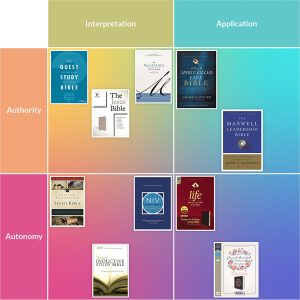
How to Choose the Best Study Bible
By Jeffrey Kranz
A study Bible is the centerpiece of serious Bible study. For many Christians, this book is not only the tool where every Bible study session starts and ends, but it’s a key resource for prayer, reflection, teaching, and spiritual growth.
You’ll use a study Bible to uncover truths about God. It’s where you’ll record and preserve the spiritual lessons you learn. It’s your launch point into deeper study, and it’s a friendly reminder of how far you’ve come.
Choosing a study Bible is no simple task. You have many, many options—and it’s important that you choose one that’s right for you.
The right study Bible at the right time can change your life—or the life of whomever you give it to. My first study Bible remains one of the most thoughtful gifts I’ve ever received, and it’s one of my most cherished possessions. In fact, my notes in that study Bible were the early framework for all of OverviewBible, my Bible literacy website and YouTube channel.
Fortunately, you don’t have to sift through all the study Bibles out there. By answering a few questions, you can zero in on just a few options and choose the study Bible that’s best for you.
I’ll show you how!
Here’s all the ground we’re going to cover:
1. What is a study Bible?
2. Key study Bible features
3. What kind of Bible study will you do?
4. 5 key factors to consider when choosing a study Bible
5. How to choose a study Bible for someone else
6. My top 3 study Bible picks
1. What Is a “Study Bible,” Anyway?
If you’ve ever been impressed by the sheer size of someone’s Bible, odds are good that you were looking at a study Bible. Study Bibles come in sizes from big to enormous, but almost all of them are noticeably thicker, wider, and heavier than a regular Bible.
That’s because a study Bible not only includes the text of Scripture, but also a host of additional content that a regular Bible doesn’t have. A given study Bible may be decked out with many, many features (like the NIV Biblical Theology Study Bible, or it might only have a select few—it depends on what that particular resource is for.
Every modern Bible includes the Old and New Testaments, plus a few basic features we expect most books to have. A table of contents, division and chapter headings, page numbers, and the like are par for the course in most Bibles.
Most regular Bibles also include some very basic study helps, such as cross references (the little superscript letters in the text that point to similar Scriptures) and footnotes (the superscript numbers that provide clarification about a verse or phrase). A regular Bible will often set the words of Christ in red, include a thematic index of Bible verses, and provide simple reading plans. They often top it all off with a few maps in the back—which make it easier to follow along with the travels of Moses, David, Jesus, and Paul.
A study Bible does all this and more.
2. Key Study Bible Features
In addition to the features of a regular Bible, most study Bibles boast several (or all) of the following features:
Study Notes
Study notes are similar to footnotes, but they bring more scholarly insight to the text. These range from explanatory sentences to more involved paragraphs exploring the subject matter. For example, many regular Bibles include a footnote next to the word “Behemoth” in Job 40:15 that simply says, “or hippopotamus.” But the NIV Biblical Theology Study Bible’s study note on the verse provides four different scholarly interpretations of the mysterious creature God is describing to Job in this passage—as well as how these various theories relate back to the central aim of this particular text: God’s wisdom far eclipses Job’s wisdom.
Articles
These are like expanded study notes. Articles cover a subject far more in-depth, and can be several hundred words long. Whereas study notes are laser-focused on a specific word or phrase, articles usually expand upon topical themes, or provide additional insight in keeping with the study Bible’s purpose. For example, the NIV Cultural Backgrounds Study Bible includes an article on ziggurats, an ancient type of building, right next to the biblical story of the Tower of Babel.
Media: Charts, Tables, Timelines, Illustrations, and Maps
Most study Bibles include visual aids to help you see more of what’s going on. Depending on the study Bible, these could include photographs of real-world archeological sites, artists’ concepts of lost artifacts, historical timelines, and family trees—the latter of which come in handy when you’re trying to figure out which of the many Herods is causing trouble at any point in the New Testament.
Whitespace and Margins
A lot of helpful insights get crammed into study Bibles. But another key differentiator is how much room is left for your own Bible study often involves note-taking and reflection—and it helps to have plenty of space in the margins (or even dedicated pages and worksheets) for you to fill in with your own observations.
Book Introductions
Most Protestant study Bibles include a page (or more) of introductory information at the beginning of each of the 66 books of the Bible. These introductions frame the following large portions of Scripture, setting up readers to better understand the text they’re about to study. If a study Bible has a given theme or focus, the book introductions will often relate the book of the Bible directly to the study Bible’s theme. For example, the NIV Study Bible introduces the Gospel of Matthew with sections on the book’s author, original audience, structure, and outline. The New Inductive Study Bible, however, opens with a brief thematic introduction and then instructions on how to observe, interpret, and apply Matthew’s gospel for yourself.
Concordances
Far more comprehensive than a simple thematic verse index, a study Bible concordance allows you to look up the significant places a given word occurs across Scripture. So while a regular Bible might give you a handful of verses that help you feel at peace, a study Bible concordance will give you a list of significant places where the Bible mentions the word “peace.”
Big-Name Editors and Contributors
Somebody has to do the job of creating the features listed above—and somebody has to make the call on what’s theologically and thematically acceptable for the study Bible as it’s being created. The individuals making these decisions need to be both capable and trustworthy—so publishers will often partner with influential scholars, pastors, and ministry leaders to lend their authority and expertise to the final work. For example, the ESV Study Bible notes were overseen by conservative Calvinist heavyweights Dr. J. I. Packer and Dr. Wayne Grudem.
That’s a lot of material on top of the (already hefty) text of Scripture. You can see why study Bibles are so bulky!But this is just the beginning. Picking your study Bible isn’t just about finding the book with the most notes or charts, or the most famous editorial team. Because the most important factor in determining which study Bible is best is how you plan to use it.
3. The Study Bible Matrix: How Do You Want to Study Scripture?
There are many study Bible options out there. But there’s a simple trick you can use to narrow down your candidates. It all comes down to how you prefer to study the Bible. If you don’t know exactly how you prefer to approach Bible study, there’s a handy exercise you can use to find out!
Ask yourself two questions:
• Are you more interested in learning what a passage of Scripture means (interpretation), or how it should affect your life (application)?
• Would you rather have an expert tell you how to interpret and apply Scripture (authority), or figure it out on your own (autonomy)?
If you put those two sets of choices against each other, you get a general map that almost all study Bibles fall into.

This is the true basis for finding a study Bible that will work for you. If you want to be told how to apply Scripture to become a better leader, you’ll love the Maxwell Leadership Bible (authority & application). If you want plenty of space to explore what the Bible means for yourself, The New Inductive Study Bible was made for you (autonomy & interpretation).
You don’t need to live in one quadrant alone. You might want to use a more autonomous study Bible for personal study so that you can draw more personal applications for yourself. In addition to that, you might prefer to have authoritative notes and articles helping you navigate difficult passages if you’re preparing Sunday school lessons. But it’s important to know what kind of Bible study you plan to do before you choose a study Bible.
Once you have this in mind, you’re ready to start thinking about the more technical criteria you need a study Bible to meet.
4. Five Factors to Consider When Choosing a Study Bible
There are almost endless ways you could approach picking a study Bible, but as someone who has worked with a great deal of study Bibles, these are the five key factors that almost everyone should consider.
1. Choose a Bible Translation that Works for You
You have many options when it comes to Bible translations—and while most people have their favorites, each one plays its part when it comes to better understanding the Bible.
The Bible was originally written in the languages of Hebrew and Greek (with a dash of Aramaic). Over the millennia, these old documents were translated into the dominant languages of the time and place, and then re-translated, and so on.
Translating ancient texts for modern readers is a tough and involved process. There are many ways it can be (and has been) done—but most English translations of the Bible fall on a spectrum from formal equivalence to functional equivalence.
Formal Equivalence (Word-for-Word)
“Formal equivalence” translations are sometimes called “word-for-word” versions of the Bible. While strict word-for-word translation is impossible outside of interlinear Bibles, versions on this end of the spectrum aim to choose words that directly mirror the words the original language uses as well as the structure of the original-language sentences.
This can be helpful when it comes to recognizing and recalling word patterns across the Bible. If you’re especially inclined to look up words in their original languages (like me!), you’ll likely enjoy a formal equivalence translation.
However, so-called word-for-word translations have a reputation for being awkward or clunky to read—especially if you’re reading aloud to a group. It’s a bit like reading the subtitles in a foreign film: although you’re sure the subtitles are technically correct translations, the words don’t feel like something you would ever naturally say.
POPULAR WORD-FOR-WORD TRANSLATIONS INCLUDE:
- English Standard Version (ESV)
- King James Version (KJV)
- New King James Version (NKJV)
- New Revised Standard Version (NRSV)
- New American Standard Bible (NASB), the poster child for formal equivalence.
Functional Equivalence (Thought-for-Thought)
“Functional equivalence” translations go in the opposite direction. These versions focus on conveying the idea behind the original languages. This can be extremely helpful when it comes to quickly absorbing the meaning of a text. If you want a study Bible that you can use both for study and evangelism, Sunday school teaching, or mentorship, a thought-for-thought translation might be the way to go.
The downside of thought-for-thought translations, when doing serious Bible study, is it can be more challenging to dig into the original languages since even more of the original text has been translated for you. You might look up one English word and find an entire Hebrew idiom underneath—which can be a little jarring for some serious Bible students.
POPULAR THOUGHT-FOR-THOUGHT TRANSLATIONS INCLUDE:
- New Living Translation (NLT)
- Good News Translation (GNT)
- The Living Bible (TLB)
- The Message, which markets itself as “a paraphrase” rather than a translation
A Blended Approach
Of course, some Bible translation committees take a blended approach: favoring a more word-for-word translation, but using thought-for-thought techniques to clarify and preserve ideas and meaning that would otherwise be literally lost in translation.
The most popular balanced translation (by far) is the New International Version (NIV). The Christian Standard Bible (CSB) and New English Translation (NET) also fall into this category.
Why Is Translation so Important?
When it comes to choosing a study Bible, it’s tempting to ask yourself, “Which translation do I want to read the Bible in?” That’s not wrong, but a more strategic way of approaching this decision is to ask yourself, “Which translation of the Bible do I want to think in?”
Your study Bible is going to be where you’re recording notes. You’ll be reading and re-reading these pages. Even if you’re not memorizing Scripture, you are going to build memories of Scripture in your study Bible. So when you choose a translation, make it one that you’re comfortable calling to mind.
2. Choose an Editorial Team You Want to Learn From
Your Bible translation determines which philosophies are represented in the text of Scripture. But perhaps more important is the philosophies represented in the rest of the text. All the notes, articles, and book introductions come from editors who have particular perspectives. It’s wise to choose a study Bible with an editorial team you’re comfortable learning from. This way the study aids will actually aid in your study.
You don’t have to 100% agree with them. But you also don’t want to pay for (and sift through) a study Bible that you don’t have confidence in.
Usually you can tell what sort of study notes a Bible will have by taking a look at the general editors. For example, D. A. Carson is the general editor of the NIV Biblical Theology Study Bible and also a founding member of The Gospel Coalition. So, you can generally depend on noncritical notes from a Christocentric perspective. On the other hand, Drs. John Walton and Craig Keener edited The Cultural Backgrounds Study Bible, so you can expect historically-informed notes that help you understand what a passage would have meant to its original readers.
Readers in the Arminian tradition might be confused by Carson-approved notes in the footers of Romans chapter 9. And readers who hold to a literal six-day creation narrative might be uncomfortable with Walton’s notes in Genesis chapter 1.
Talk to your pastor about this. Your church leader should be able to point to scholars and ministry leaders who share key beliefs. Your pastor can also give you a heads-up on key passages, topics, and issues on which your church and a given editorial team disagree. This is especially important if you’re new to Bible study. The last thing you want to do is invest hours of personal Bible study only to find out that the things you’ve learned are considered divisive or not in alignment with your church community.
There’s a lot to be gained from studying a wide range of views on Scripture (or any subject, for that matter). But most people prefer that the notes and articles in their study Bible are coming from pastors, scholars, or a faith tradition that they already trust.
POPULAR STUDY BIBLES BY EDITORIAL TEAM:
- The Jesus Bible (available in NIV and ESV)—Louie Giglio
- NIV Biblical Theology Study Bible—D.A. Carson
- The Charles F. Stanley Life Principles Bible (available in NIV, NKJV, NASB, and KJV)—Charles Stanley
- ESV Study Bible—Wayne Grudem & J. I. Packer
- The Jeremiah Study Bible (available in NKJV, ESV, and NIV)—David Jeremiah
- The MacArthur Study Bible (available in NKJV, NASB, ESV, and NIV)—John MacArthur
- CSB Tony Evans Study Bible—Tony Evans
- The Ryrie Study Bible (available in KJV and NASB)—Charles Ryrie
3. Choose How General or Focused You Want Your Study to Be
Study Bibles have a wide variety of aims, purposes, and focuses. Many take a general, come-one-come-all approach. Other study Bibles are built for audiences with specific interests.
General study Bibles simply aim to help the reader better understand Scripture. They’re intended for people of all ages, genders, cultures, and academic backgrounds. The insights and study aids try to be broadly applicable, so they can help anyone develop a better understanding of the text.
But some study Bibles take a more targeted approach—and the following are ways study Bibles do this:
- Demographic. There are a handful of study Bibles with notes, articles, and other features overtly designed to appeal to specific demographics of people—men, women, teens, etc.
- Specific themes. The Bible plays a key role in how many Christians think about current world issues—which means some publishers have produced study Bibles with notes specifically aimed at helping readers gain a biblical understanding of important issues, such as Christianity and culture, caring for the environment, marriage, recovery, or human rights.
- Theological perspective. There are many different systems of theological thought, and it’s becoming more and more common to find study Bibles that focus on developing a certain approach to biblical observation, interpretation, and application to bear. Beyond this, many study Bibles are built to help people see how the theologies of their faith traditions are developed across Scripture.
- Study approach. Similar to theological perspective, some study Bibles are built around helping you approach Scripture using a certain Bible study method. This could involve understanding the cultural background of a certain passage, using the inductive Bible study method, or just applying what you learn to your day-to-day life.
POPULAR GENERAL STUDY BIBLES:
- NIV Study Bible. In many ways, this is the general study Bible. The team of evangelical scholars who wrote and edited the study notes also served on the translation team for the NIV itself.
- ESV Study Bible. A comprehensive evangelical study Bible, backed by many leading Reformed scholars and pastors.
- NIV Halley’s Study Bible. Includes notes and media developed from the classic Halley’s Bible Handbook.
- CSB Study Bible. A comprehensive evangelical study Bible with a contributor team that heavily leans on Southern Baptist scholars.
- NKJV Study Bible. A conservative study Bible popular among readers of the New King James Version.
POPULAR FOCUSED STUDY BIBLES
- Method: New Inductive Study Bible (available in NASB and ESV). Based on the inductive method (observe, interpret, apply) as popularized by Dr. Kay Arthur.
- Method: NIV Quest Study Bible. Notes and articles answering commonly-asked questions.
- Method: Life Application Study Bible (available in NLT, NIV, NASB, NKJV, and KJV). Notes focusing on applying the Bible to everyday life.
- Theology: Spirit-Filled Life Bible (available in NKJV, NIV, and NLT). Approaches Bible study in the Spirit-filled tradition.
- Theology: The Jesus Bible (available in NIV and ESV). Specifically shows how the story of Jesus is developed throughout every passage of the Bible.
- Demographic: Woman’s Study Bible (available in NKJV and NIV). Insights designed to speak to godly womanhood.
- Demographic: NIV Teen Study Bible. Specifically designed to address issues teens face every day.
- Demographic: The Adventure Bible (available in NIV, NIrV, and NKJV). Meant for 8 to 12-year-olds with hands-on activities, memory verses, and facts to keep kids engaged with the Bible.
- Issue: The NIV Celebrate Recovery Study Bible. Study helps based on principles of addiction recovery.
- Issue: The Maxwell Leadership Bible (available in NKJV and NIV). Complements Scripture with leadership-development teachings and insights from John C. Maxwell.
4. Choose the Academic Level That’s Right for You
This can be a tricky one. Some study Bibles are created for people with no formal education in theology, while others assume a baseline level of intermediate or advanced knowledge. It can be difficult to get a straightforward read on a study Bible in this regard, because any study Bible represents a massive academic undertaking. Most study Bibles tout having scholars on their editorial teams—as they should—but it can be tough to get an idea of how approachable the articles and study notes will be.
However, too academic is far better than not academic enough. Getting a Bible with articles and notes that are a little out of your depth can be frustrating at first, but eventually you can grow into it.
That’s not the case if you get a study Bible with notes that are already old news to you. It’s frustrating when space in your Bible is taken up by information that doesn’t help you gain a deeper understanding of the text.
A good way to test if a Bible is academically “in your league” is to reference a passage of Scripture you know well, or a passage you find intriguing. Look at the notes and articles surrounding that passage. Do you learn anything new? Or do they feel pedestrian to you? Would you want to study with a Bible that brings this level of illumination to the rest of the text?
This can be the difference between finding a study Bible you treasure for decades and finding a study Bible that you move on from within a few months.
SOME NOTABLY ACADEMIC STUDY BIBLES INCLUDE:
- Cultural Backgrounds Study Bible (available in NIV, NRSV, and NKJV). Full of insights and articles about the Ancient Near East and Roman Empire cultures and traditions. (I cannot recommend this resource highly enough.)
- NIV Biblical Theology Study Bible. Shows how the Bible’s themes and narratives developed through the ages.
- I’ll take these three together since they are very similar: Oxford Annotated Bible, HarperCollins Study Bible, and Baylor Annotated Study Bible. All three use the NRSV as their English text and contain notes of some of today’s leading scholars in biblical studies. They don’t shy away from critical scholarship, so they aren’t ideal for every audience.
- The Hebrew-Greek Key Word Study Bible (available in NASB, KJV, NKJV, and ESV). Reveals the underlying Greek and Hebrew meanings behind “key words” (important terms) in the English Bible.
SOME NOTABLE STUDY BIBLES THAT TRY TO BALANCE BEING ACADEMIC AND APPROACHABLE INCLUDE:
- NIV Study Bible, Fully Revised Edition. The team of evangelical scholars who wrote and edited the study notes also served on the translation team for the NIV itself.
- CSB Study Bible. A comprehensive evangelical study Bible with a contributor team that heavily leans on Southern Baptist scholars.
- NLT Illustrated Study Bible. In-depth study notes are paired with hundreds of stunning visuals.
- NIV Storyline Bible. Rather than bottom-of-the-page notes, this Bible features hundreds of articles for deeper insight.
SOME NOTABLY APPROACHABLE STUDY BIBLES INCLUDE:
- Life Application Study Bible (available in NLT, NIV, NASB, NKJV, and KJV). Study notes and articles are all focused on giving you ways to use what you learn in Scripture.
- NIV Starting Place Study Bible. Combines the most approachable features of various study Bibles and resources—a fine introduction to both Bible study and study Bibles.
- NIV Quest Study Bible. Margins are filled with question-and-answer insights on the passage at hand—especially helpful for curious people new to Bible study.
- NLT Christian Basics Bible. Designed specifically for those new to the Bible, and built around the easy-to-read New Living Translation, with features to make Scripture approachable, and less intimidating.
5. Choose a Study Bible with the Features You Want
This brings us full-circle. A study Bible is Scripture outfitted with tools to help you better study, understand, and apply it to your life. And while translation, editorial team, focus, and academic level are important, you want a study Bible to include the actual tools you’ll use in study.
This is where you’ll consider things like charts and media. Do you want a Bible with plenty of maps? Do you care about photography? Do you need a lot of margin space for notes? (I sure do.) Do you want a great deal of notes and articles?
This is a rather easy thing to look into—because most study Bibles will list these features on the back cover and on their online product pages.
STUDY BIBLES WITH OUTSTANDING FEATURES:
- BOOK INTRODUCTIONS: NIV Study Bible. Comprehensive introductions give a grasp of what is known about a book’s author, date, and purpose, as well as a full outline of each book’s structure.
- ARTICLES: Cultural Background Study Bible. Callout texts provide details on ancient customs, documents, and practices that the original readers of Scripture would have been familiar with, but are unfamiliar to modern readers.
- WHITESPACE: New Inductive Study Bible. Wide margins and plenty of space for writing your own chapter headings, paragraph headings, and book outlines.
- CONCORDANCE: NIV Study Bible takes the cake on this again—it’s the largest, most comprehensive concordance ever bound in an English Bible. If you want a better concordance, you’ll need to either use digital tools or buy a separate book.
5. What Kind of Study Bible Makes the Best Gift?
If you know how fantastic it is to have a good study Bible of your own, then you might want to get one for someone else. The right study Bible can be a wonderful and cherished gift—so it helps to be intentional when choosing one for someone else.
If you know the person you’re giving the Bible to very well, then you can run through the five factors discussed above and likely emerge making a well-informed decision. But it helps to take the following extra factors into account:
- How experienced are they with Bible study? If you’re getting a study Bible for someone who’s uninitiated in Bible study, you’ll want to get them something that will give them some tools and pointers for getting started.
- How long do you want them to use this? You can’t decide if or for how long your gift will be someone’s go-to Bible study resource. But you can make a few strategic decisions if you’re trying to give them THE study Bible that they treasure for a long time. If you want a study Bible with staying power, opt for a more general (less focused) one, and one that gives the reader plenty of autonomy and whitespace. This allows them to make this study Bible their own. The more of oneself someone puts into their Bible, the more precious that Bible becomes to them.
A study bible can be one of the most thoughtful gift ideas. It’s certainly one of the best gifts I’ve ever received. Choosing the right study Bible as a gift can make a meaningful statement—and a difference—to someone you care about.
STUDY BIBLES THAT MAKE GOOD GIFTS FOR PEOPLE NEW TO BIBLE STUDY:
- Life Application Study Bible
- NIV Starting Place Study Bible
- The Jesus Bible
But if you want to give someone a study Bible with long-lasting staying power: The NIV Study Bible, Fully Revised Edition, is hard to beat. The rich, translator-crafted study notes and articles, the book introductions, and the updated media make it a study Bible that’s valuable within the first 20 minutes, and will still be valuable after 20 years.
6. Make the Smart Choice (Here’s My Top 3 Picks)
There are so many study Bible options—and there are always new ones coming out. If you’re curious, here are my top picks:
- Most balanced: NIV Study Bible, Fully Revised Edition.
- Best for DIY Bible study: NASB New Inductive Study Bible. Much of what has become OverviewBible began in the notes and margins of my own New Inductive Study Bible.
- Best for academic study: Cultural Backgrounds Study Bible (NIV, NKJV, and NRSV).
But these are just the ones that do the trick for me. If you keep this decision framework in mind, you’ll always be ready to research and vet new study Bible options.
Now you have all you need to choose your first study Bible, pick a gift, or explore your next study Bible.
Happy hunting!






